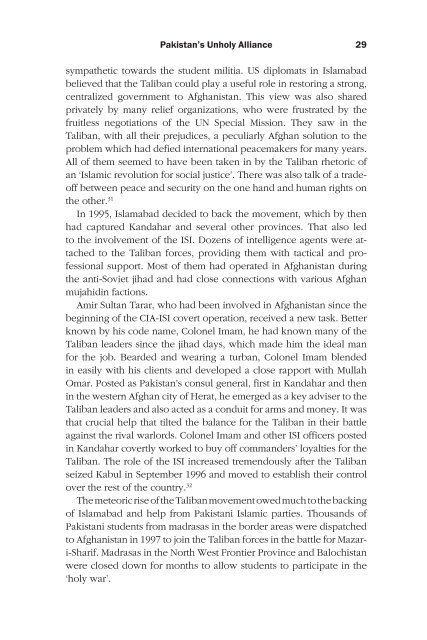Frontline Pakistan : The Struggle With Militant Islam - Arz-e-Pak
Frontline Pakistan : The Struggle With Militant Islam - Arz-e-Pak
Frontline Pakistan : The Struggle With Militant Islam - Arz-e-Pak
Create successful ePaper yourself
Turn your PDF publications into a flip-book with our unique Google optimized e-Paper software.
<strong><strong>Pak</strong>istan</strong>’s Unholy Alliance<br />
sympathetic towards the student militia. US diplomats in <strong>Islam</strong>abad<br />
believed that the Taliban could play a useful role in restoring a strong,<br />
centralized government to Afghanistan. This view was also shared<br />
privately by many relief organizations, who were frustrated by the<br />
fruitless negotiations of the UN Special Mission. <strong>The</strong>y saw in the<br />
Taliban, with all their prejudices, a peculiarly Afghan solution to the<br />
problem which had defied international peacemakers for many years.<br />
All of them seemed to have been taken in by the Taliban rhetoric of<br />
an ‘<strong>Islam</strong>ic revolution for social justice’. <strong>The</strong>re was also talk of a tradeoff<br />
between peace and security on the one hand and human rights on<br />
the other. 31<br />
In 1995, <strong>Islam</strong>abad decided to back the movement, which by then<br />
had captured Kandahar and several other provinces. That also led<br />
to the involvement of the ISI. Dozens of intelligence agents were attached<br />
to the Taliban forces, providing them with tactical and professional<br />
support. Most of them had operated in Afghanistan during<br />
the anti-Soviet jihad and had close connections with various Afghan<br />
mujahidin factions.<br />
Amir Sultan Tarar, who had been involved in Afghanistan since the<br />
beginning of the CIA-ISI covert operation, received a new task. Better<br />
known by his code name, Colonel Imam, he had known many of the<br />
Taliban leaders since the jihad days, which made him the ideal man<br />
for the job. Bearded and wearing a turban, Colonel Imam blended<br />
in easily with his clients and developed a close rapport with Mullah<br />
Omar. Posted as <strong><strong>Pak</strong>istan</strong>’s consul general, first in Kandahar and then<br />
in the western Afghan city of Herat, he emerged as a key adviser to the<br />
Taliban leaders and also acted as a conduit for arms and money. It was<br />
that crucial help that tilted the balance for the Taliban in their battle<br />
against the rival warlords. Colonel Imam and other ISI officers posted<br />
in Kandahar covertly worked to buy off commanders’ loyalties for the<br />
Taliban. <strong>The</strong> role of the ISI increased tremendously after the Taliban<br />
seized Kabul in September 1996 and moved to establish their control<br />
over the rest of the country. 32<br />
<strong>The</strong> meteoric rise of the Taliban movement owed much to the backing<br />
of <strong>Islam</strong>abad and help from <strong><strong>Pak</strong>istan</strong>i <strong>Islam</strong>ic parties. Thousands of<br />
<strong><strong>Pak</strong>istan</strong>i students from madrasas in the border areas were dispatched<br />
to Afghanistan in 1997 to join the Taliban forces in the battle for Mazari-Sharif.<br />
Madrasas in the North West Frontier Province and Balochistan<br />
were closed down for months to allow students to participate in the<br />
‘holy war’.













